Fem(inism) Fatale: Lisa Morton on Women in Horror
By, Désirée I. Guzzetta
Lisa Morton is something of a renaissance woman in the horror field. She’s won three Stoker Awards in three different categories: Short Fiction in 2006 (Tested), Nonfiction in 2008 (A Hallowe’en Anthology), and Long Fiction in 2009 (The Lucid Dreaming). She also picked up a 2009 Black Quill Award for Best Dark Genre Anthology (for editing Midnight Walk). She’s written and/or produced several films, including Meet the Hollowheads and Tornado Warning. Her nonfiction work showcases her expertise on Asian cinema, actress Ann Savage, and Halloween. In fact, she was recently interviewed by the History Channel for an upcoming documentary about the spooky holiday.
On top of all that, she’s written, produced, and/or directed several small theater productions; worked as a television critic and Associate Editor for Horror magazine; and did film stints as a modelmaker, photographer, miniatures coordinator, and more.
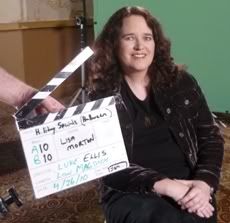 A native Angeleno who spent many nights as a child building monster models with her dad and watching horror movies with her mom, Morton’s favorite genre to read surprisingly wasn’t horror, but science fiction. Despite dressing as a monster every Halloween (“It was the one night of the year it was okay to be a little girl who liked monsters,” she says), her desire to write in the horror genre wasn’t sparked until she was in her twenties and discovered Dennis Etchison’s brand of character-focused, urban scare. A steady diet of Philip K. Dick and other SF writers gave way to Etchison, Theodore Sturgeon, and Roberta Lannes. Her favorites nowadays include Sarah Langan, Bentley Little, Gary Braunbeck, and Alexandra Sokoloff.
A native Angeleno who spent many nights as a child building monster models with her dad and watching horror movies with her mom, Morton’s favorite genre to read surprisingly wasn’t horror, but science fiction. Despite dressing as a monster every Halloween (“It was the one night of the year it was okay to be a little girl who liked monsters,” she says), her desire to write in the horror genre wasn’t sparked until she was in her twenties and discovered Dennis Etchison’s brand of character-focused, urban scare. A steady diet of Philip K. Dick and other SF writers gave way to Etchison, Theodore Sturgeon, and Roberta Lannes. Her favorites nowadays include Sarah Langan, Bentley Little, Gary Braunbeck, and Alexandra Sokoloff.
The Castle of Los Angeles, her new novel, focuses on Beth Ortiz, a young director who opens a new theater in a building dubbed “The Castle,” a deliberate reference to the classic Gothic novels Morton mines for tropes to warp while tackling issues of identity and monstrous femininity from a feminist perspective.
Morton’s feminism, in fact, informs all her work and her views on the dismal state of women in certain segments of horror fiction. Dark Scribe Magazine recently caught up with Morton at one of her favorite local haunts, a diner where the pie is sky high and everyone knows your name. Relishing a plate of comfort food (roast turkey with all the trimmings), the normally soft-spoken Morton became quite animated addressing what she sees as hypocrisy and inequality when it comes to women and the small press; authors who decry racism and homophobia, yet write indulgently misogynistic horror; and readers who believe women can’t write effective horror.
Dark Scribe Magazine: Why do you think so few women are published by horror’s small press? Is there a glass ceiling when it comes to horror? Some kind of old boys’ network?
Lisa Morton: Part of the problem with the small press is that it has decided to pursue what it thinks is cutting-edge fiction, and too often in the horror genre, cutting-edge fiction means excessive sex and that translates to excessive scenes of rape and mutilation of women. Obviously, there aren’t a lot of women who want to write that. I certainly don’t — for one thing, it’s BORING. I think that’s part of the reason you don’t see more women trying to break into the small press. They look at it and they just think, “Why would I bother?”
Dark Scribe: I notice a lot of what’s labeled “transgressive fiction” is the same way — a lot of sex and violence and violent sex. It does get boring and if you’re a female reader, you don’t want to keep reading constantly about the different ways that women can be debased.
Lisa Morton: I’m very disappointed that more small press publishers don’t take the leaps beyond that. I think they have a safe audience, but it’s a very small audience. Most of these things come out in editions of 300 books or less. Why not find something different? Why not expand the borders of the genre? There are a few small presses that are doing that now. Chizine is doing it up in Canada, Dark Scribe is doing more of it, Bad Moon is doing more of it.
Dark Scribe: Why is the small press so important to you? A lot of people would be focusing on mainstream and breaking into the mainstream press.
Lisa Morton: (laughing) I’m focusing on that, too! Part of it is just technical. You can’t sell a novella 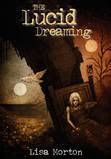 anywhere else, and I love the novella form; I love the idea of writing something that’s only 20,000 words because I tend to be a very terse writer. I like that idea of using the small press for things that you can’t do with the majors, the odder forms like the novella or the things that might be non-acceptable or not marketable to major publishers, like The Lucid Dreaming. The fact that my heroine is a violent paranoid schizophrenic — I’m not going to get that in at HarperCollins.
anywhere else, and I love the novella form; I love the idea of writing something that’s only 20,000 words because I tend to be a very terse writer. I like that idea of using the small press for things that you can’t do with the majors, the odder forms like the novella or the things that might be non-acceptable or not marketable to major publishers, like The Lucid Dreaming. The fact that my heroine is a violent paranoid schizophrenic — I’m not going to get that in at HarperCollins.
Dark Scribe: Why do you think that women’s issues are less important than some other issues to horror writers? Some horror writers readily decry racism or homophobia, yet seem to have no problem writing rape scenes where women are brutalized.
Lisa Morton: I’ve seen male readers on message boards, not writers, who say, “Well, of course there’s a lot of rape in these stories because it happens in real life and it’s disturbing.” Dude, so are about 8 billion other things!
Dark Scribe: There are other ways to be scary than to pop eyeballs at people.
Lisa Morton: (laughing) Or to cut off a woman’s leg and fuck the stump.
Dark Scribe: Why do you think it’s easier for some to write what you call the “fuck the stump” style of horror?
Lisa Morton: It doesn’t involve any real imagination. There are templates for it because it’s done very much, and I think unfortunately, there’s a market for it. There is an audience, men, I’m assuming not many women, who like to read this sort of thing, and the fact that it keeps getting published and bought tells me that there’s people who keep reading it. I don’t know; I prefer not to think that these people are all wildly misogynistic, but there’s undoubtedly got to be some of those.
Dark Scribe: What can female writers do to counteract this?
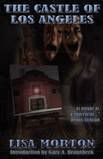 Lisa Morton: By writing better than the men, writing more imaginatively, and writing scary things. I recently had a female critic review The Castle of Los Angeles and she said something that I thought was very interesting. She loved the book but said, “I don’t usually like horror by women authors, but I really like your stuff,” and I thought, “Wow, that’s a really interesting comment on about three different levels.”
Lisa Morton: By writing better than the men, writing more imaginatively, and writing scary things. I recently had a female critic review The Castle of Los Angeles and she said something that I thought was very interesting. She loved the book but said, “I don’t usually like horror by women authors, but I really like your stuff,” and I thought, “Wow, that’s a really interesting comment on about three different levels.”
Dark Scribe: There seems to be a pervasive, albeit small, belief by readers of horror that women don’t write horror as well as men. Why do you think they believe that?
Lisa Morton: Well, part of it is that they haven’t made the effort to seek out and read more female writers. When you’re busy consuming the next Ed Lee or Brian Keene novel, you’re not likely to go out and try to find the latest work by Sarah Langan or Alex Sokoloff or Rhodi Hawk or Lisa Tuttle, or any of the other women who are published in different markets.
Dark Scribe: Do you think that attitude is encouraged by male writers?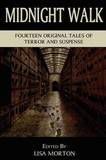
Lisa Morton: Oh, yes! For example, there’s a certain male writer who’s immensely popular among the smaller press crowd. I tried to read three of his books, and in every one, he perpetually refers to nearly every female character as “bitch.” That is misogynist. I wouldn’t write a novel in which I referred to every male character repeatedly as “dick.” I think it would be, among other things, very silly. I actually complained to someone about that once: “Jesus, at least call her a ‘cunt,’ a ‘pussy,’ or a ‘whore’ or ‘slut,’ anything!” It’s boring after awhile. When you’re reading male writers who refer to a female character over and over as “bitch” and then proceed to take these characters and have them raped and mutilated and murdered repeatedly, yeah, you kind of put a pattern together.
Dark Scribe: This goes back to a topic I brought up earlier, that is, why do you think women’s issues are still not being heard after all these years?
Lisa Morton: Women are not entirely without blame here, either. A lot of women have found a tremendous amount of success in the paranormal romance or urban fantasy thriller, and they’re being published by big publishers. Why would you want to go and be published by these guys who are doing 300 copies when your publisher just printed a hundred thousand of your new book? I was part of a brief-lived group for awhile that was out to serve and promote female horror writers. And within that group, I heard a lot of women complaining about not receiving the same kinds of attention or options that male writers got, and yet when they wrote, they wrote paranormal romances. I didn’t see a lot of effort being made there to break out of that very traditional female role.
Dark Scribe: What can female horror writers do to overcome the stigma that they aren’t as good as male horror writers?
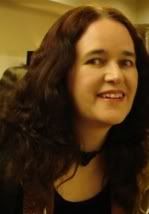 Lisa Morton: Like I said, the obvious answer is write better, write more imaginatively, and write things that are genuinely transgressive. I don’t know why this notion of pushing the envelope or breaking taboos has come to mean nothing but grotesque sex. How about political taboos? Social taboos? Why are there so few horror stories written about abortion? Why are there so few written about right- or left-wing politics? Or about unjust wars? There’s a pat, snide answer which most horror fans would give you, which is, “I’m not interested in reading about that.” Well, you would be if it was written properly, if it was written in a way that really did shock you into thinking about it!
Lisa Morton: Like I said, the obvious answer is write better, write more imaginatively, and write things that are genuinely transgressive. I don’t know why this notion of pushing the envelope or breaking taboos has come to mean nothing but grotesque sex. How about political taboos? Social taboos? Why are there so few horror stories written about abortion? Why are there so few written about right- or left-wing politics? Or about unjust wars? There’s a pat, snide answer which most horror fans would give you, which is, “I’m not interested in reading about that.” Well, you would be if it was written properly, if it was written in a way that really did shock you into thinking about it!
Dark Scribe: Like what you’re doing in The Lucid Dreaming and The Castle of Los Angeles.
Lisa Morton: Well, I’m being kind of obvious about a few things, too. A story I wrote that’s been reprinted a number of times now is a zombie story called "Sparks Fly Upward" — it’s about abortion very specifically. It ends up with the climax of the story revealing that abortion is not murder because an aborted fetus does not come back as a zombie. So it answers that question once and for all. I had one or two people get very upset by that story, tell me they thought it was preachy and over-the-top and I should never have published it. I consider that a great success.
Dark Scribe: By the way, I love that your protagonist in The Castle of Los Angeles is half-Mexican American. Was there a reason for that?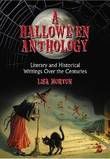
Lisa Morton: Yes. I think that too many horror writers focus on middle-class heterosexual white people, and I’m really tired of that. I’ve grown up in L.A., I’m around people who aren’t like me every day, I think that’s great, and I don’t know why more writers don’t use that. I also wanted to play with the idea that Beth had never been entirely comfortable with her own identity, and it made sense to me that if she’s a classical L.A. person, she would combine Latin heritage with white.
Dark Scribe: What advice would you give a woman who is just embarking on her own horror writing career?
Lisa Morton: Network, get out and meet people, be fearless, don’t be afraid to tackle these bigger issues, don’t be afraid to write rough.
Dark Scribe: What do you mean, “write rough”?
Lisa Morton: Don’t limit yourself to the paranormal romance, which is an easy sell for a lot of women. But you know what, if you’re making money off that, it’s hard to say don’t write it.
For more information on Lisa Morton, visit her official author website.




Reader Comments